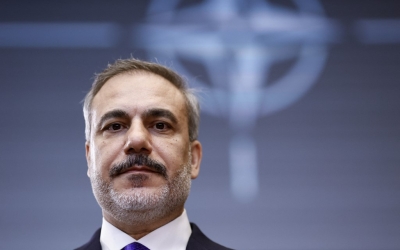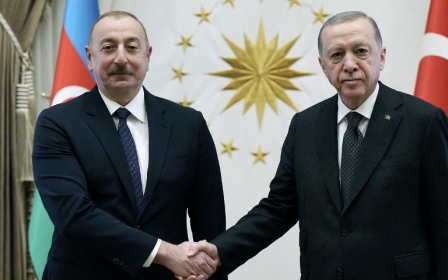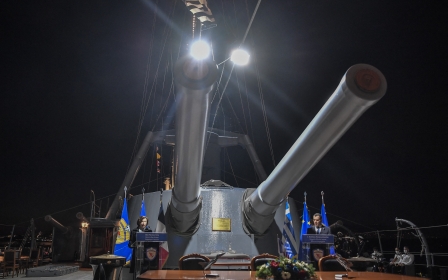Cyprus: From early Zionist colony to military base for Israel's war on Gaza

Last week, in a major televised address, Hezbollah leader Hassan Nasrallah threatened Cyprus with military action if it continues its military cooperation with Israel, whose army has been training in the island nation for an attack on Lebanon.
Nasrallah did not mince words: "Opening Cypriot airports and bases to the Israeli enemy to target Lebanon would mean that the Cypriot government is part of the war, and the resistance will deal with it as part of the war."
Indeed, the Cypriots have not only become Israel's close friend but also a major US ally. Cypriot Foreign Minister Constantinos Kombos visited the US on 17 June and coordinated with Secretary of State Antony Blinken on whatever role the Americans have assigned to Cyprus in the ongoing situation in the Middle East.
New MEE newsletter: Jerusalem Dispatch
Sign up to get the latest insights and analysis on Israel-Palestine, alongside Turkey Unpacked and other MEE newsletters
In response to Nasrallah, President Nikos Christolides of Cyprus denied any Cypriot involvement in the ongoing Israeli genocidal war on the Palestinians and its war against Lebanon.
Cyprus also asserted that it has no control over the two British military bases in the country, which cooperate militarily with Israel.
However, Kornelios Korneliou, the Cypriot ambassador to Israel, responded more hostilely to Nasrallah. He reaffirmed the close relationship between Israel and Cyprus, which he gleefully concluded must be displeasing to the Hezbollah leader.
A 'love affair'
The recent love affair between Cyprus and Israel has been in the making for more than three decades. Yet the closeness of that relationship did not become apparent until March 2011, when former President Dimitris Christofias, of the communist "Progressive Party of Working People", went on an official visit to Israel.
Benjamin Netanyahu reciprocated and, in 2012, became the first Israeli prime minister to embark on an official visit to Cyprus.
Much more cooperation was to be gained, including Israel's help in deepening the relationship between the US and Cyprus
While the principal common interests initially appeared to involve the Mediterranean gas reserves lying between Cyprus and the shores of the eastern Mediterranean, much more cooperation was to be gained, including Israel's help in deepening the relationship between the US and Cyprus.
Cyprus's leftist leader was not the only leftist member of the EU to foster close ties with Israel. Similar warmth with Israel became the order of the day ever since the leftist Syriza party came to power in Greece in 2015.
In 2021, Cyprus and Greece participated in naval exercises with Israel.
But if Cyprus began to cosy up to Israel only recently in its history, Christian and Jewish Zionists have had a much longer involvement in Cypriot affairs.
Upon the British takeover of Cyprus in 1878, the London Jewish Chronicle wrote: "Cyprus was once the seat of a flourishing Jewish colony of Jews…Why may it not be so again?"
Follow Middle East Eye's live coverage of the Israel-Palestine war
The article called on the Jews of Palestine and Greater Syria to emigrate to the island, as Cyprus "offers" them "the same tempting attractions as it did to the Jews of old, nay greater. It is within a day's sail of the mainland. And for the first time in the world's history the Jews of Palestine have the opportunity of living under the beneficent institutions of the most enlightened and the most liberal of rules [of Britain], without submitting to the pain of migrating to distant climes, and renouncing their oriental mode of life".
The British annexed Cyprus in 1914 when the Ottomans joined the Central Powers, and Cyprus became a British crown colony in 1925.
A Zionist colony?
The Zionists have always referred to the ancient Hebrew colonies in Cyprus, whose ancient Hebrew name (which is still used in modern Hebrew) is "Kafrisim", including Paphos and Salamis, as a precedent for future colonisation. It was the British-Israelites, however, who became the most ardent British Protestant group supporting Jewish colonisation.
Founded in 1874, the group comprised ardent Zionists who were intent on sending Jews to the "Holy Land". They established the Syrian Colonisation Fund (also known as the Society for the Relief of Persecuted Jews), which received donations in England and was able to purchase lands near Palestine.
They began dispatching East European Jewish immigrants from England to their new colonies. The first Jewish colony was set up in the port city of Latakia in northwestern Syria in 1882 but lasted just one year.
In 1883, the Jewish colonists of Latakia, along with more Jews from Russia, were moved to Cyprus to establish a Jewish colony there. They set up the colony in the southwest of the island near the village of Kouklia. The colonists, however, were dissatisfied with farm work there and decided to leave by 1884.
Cyprus had already been of interest to Davis Trietsch, a German Jewish early proto-Zionist activist.
In 1893, Trietsch expressed interest in what should be done with Cyprus:
"Here was a land with which the English did not know what to do, while, on the other hand, Jews everywhere were searching for a place of settlement for their brethren…Cyprus was in the immediate vicinity of Palestine. I knew that among Jews there existed the desire to colonise Palestine but this…could not be realised owing to the position of the Turkish government. It appeared to me then that the natural and beautiful idea of a return to the Old Land could very well be combined with a colonisation in Cyprus –whether or not England would remain there."
When he came across Zionism founder Theodor Herzl's pamphlet "The State of the Jews", published in 1896, Trietsch was encouraged and travelled to attend the first Zionist Congress in Basel in 1897. A few weeks after the conference, he wrote to Herzl about his idea and maintained an ongoing correspondence with him on the matter.
With Herzl's support, Trietsch addressed the Third Zionist Congress in 1899 on the matter, but few agreed with him. He argued at the fifth Zionist Congress in 1901 for the conception of "Greater Palestine", of which Cyprus would be a part. Therefore the colonisation of the island would be part of the Zionist project rather than an alternative to it.
It was here that Cyprus became a potential location for Jewish colonisation.
Greater Palestine'
In 1897, the Jewish Colonisation Association (JCA) had established a Jewish colony in Cyprus for Russian Jews, who were joined by Russian Jewish settlers from Palestine.
The colony at Margo-Tchiflik, 14km from Nicosia, had a population under 200 and was finally dismantled in 1927 when its colonists opted to colonise Palestine instead.
Soon after Herzl, the founder of the World Zionist Organisation, identified Britain as the ideal sponsor of Jewish colonisation, he held private talks with British officials. He was specific about where Jewish colonisation should begin.
When Herzl met with British colonial secretary Joseph Chamberlain, he proposed Cyprus (where the JCA already had a colony), el-Arish and the Sinai Peninsula.
Chamberlain, a Christian Zionist and an antisemite who opposed East European Jewish immigration to Britain, was sympathetic but affirmed that Britain would not expel the Greeks and "Moslems" of Cyprus for the sake of Jewish colonists.
Herzl explained his plan to establish a "Jewish Eastern Company" with £5m ($24.5m) capital for colonising Sinai and el-Arish, money that would attract the Cypriots: "The Moslems will move away, the Greeks will gladly sell their land at a good price and migrate to Athens or Crete."
However, given Chamberlain's reservations about expelling the Cypriots, the Egyptian alternative became more practical. Herzl and other Zionists travelled to Egypt in 1903. They met with its British colonial governor, Lord Cromer, to negotiate the colonisation by Jews of the area between the Nile and the Suez Canal.
The project, however, did not materialise due to the arid conditions in the area, a conclusion that was reached by the Zionist envoys to the region.
Herzl and Trietsch came to blows at the Sixth Zionist Congress in 1903 over the abandonment of the Greater Palestine projects of Cyprus, Sinai and el-Arish. This happened in view of a new British offer of Uganda for Jewish colonisation, a territory that was not part of the Zionist-imagined "Greater Palestine". The plans for Cyprus also never materialised.
Following World War One, the Zionists won British sponsorship of their colonisation project in Palestine. Indeed, the Zionists would make good use of British colonial methods used in Cyprus to divide Muslim and Christian Cypriots.
In January 1922, Britain's Zionist high commissioner in Mandatory Palestine, Herbert Samuel, invented a new sectarian office for Palestinian Muslims that he named the Supreme Muslim Council to undermine intercommunal solidarity between Palestinian Muslims and Christians. He modelled it on prior British colonial policy toward the native Muslims of Cyprus.
Pariah state
Before Cyprus adopted EU pro-Zionist toxicity, as had Greece, Cyprus had historically defended the Palestinians and their rights and recognised the State of Palestine.
Its pro-Palestinian position was such that in 1993, Israel declared first lady Androulla Vassiliou, wife of Cypriot President George Vasiliou, persona non grata in Israel when a delegation she led attempted to meet with Yasser Arafat, president of the Palestinian Authority, whom the Israelis placed under house arrest in his office building in Ramallah.
If the Cypriots find Israeli genocidal wars across Palestine so unobjectionable, perhaps they can offer their own country for Jewish colonisation
Today, as more and more countries are cutting off relations and imposing sanctions on Israel, Cypriot ties with the Israeli settler colony continue to strengthen.
The country's isolation and transformation into a pariah state internationally seems irrelevant to the Cypriots.
If the Cypriots indeed find Jewish colonisation and Israeli genocidal wars across Palestine so unobjectionable as to continue warm relations and military cooperation, perhaps they can offer their own country for Jewish colonisation and revive Zionist dreams of taking over the island.
This is especially so as the embassy of Cyprus in Tel Aviv celebrates the ancient Hebrew colonies in its country. Strangely, it does not seem to celebrate the colonies at Kouklia or Margo-Tchiflik.
Perhaps, given this Cypriot welcome, the Zionists could begin a new call for the "return" of modern Jews to the ancient Hebrew colonies in Kafrisin and the more recent Zionist ones in Kouklia and Margo-Tchiflik, as this could reduce their ceaseless colonisation of the lands of the Palestinians.
The views expressed in this article belong to the author and do not necessarily reflect the editorial policy of Middle East Eye.
Middle East Eye delivers independent and unrivalled coverage and analysis of the Middle East, North Africa and beyond. To learn more about republishing this content and the associated fees, please fill out this form. More about MEE can be found here.







